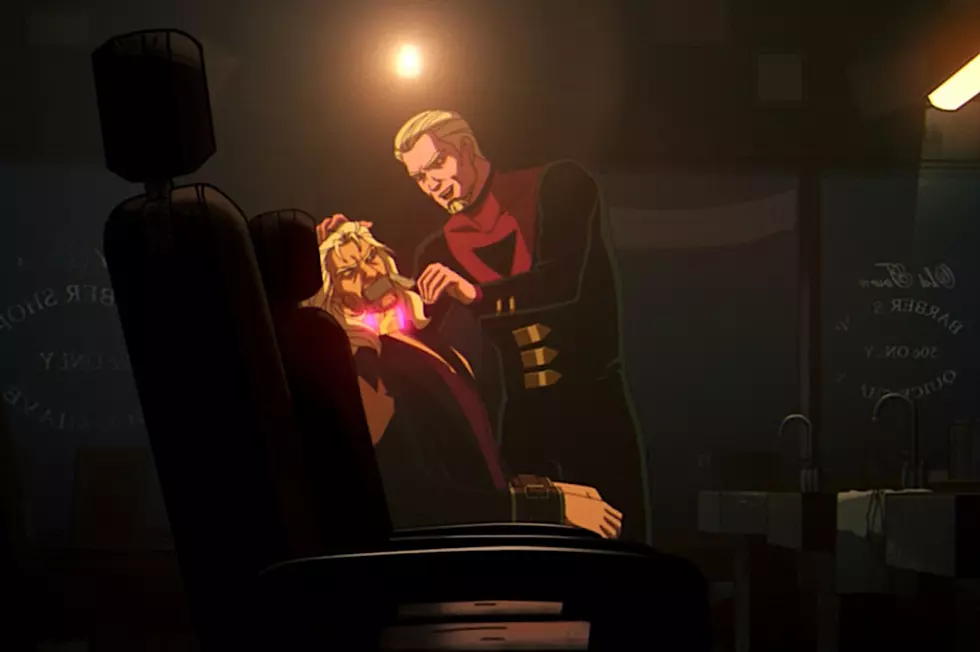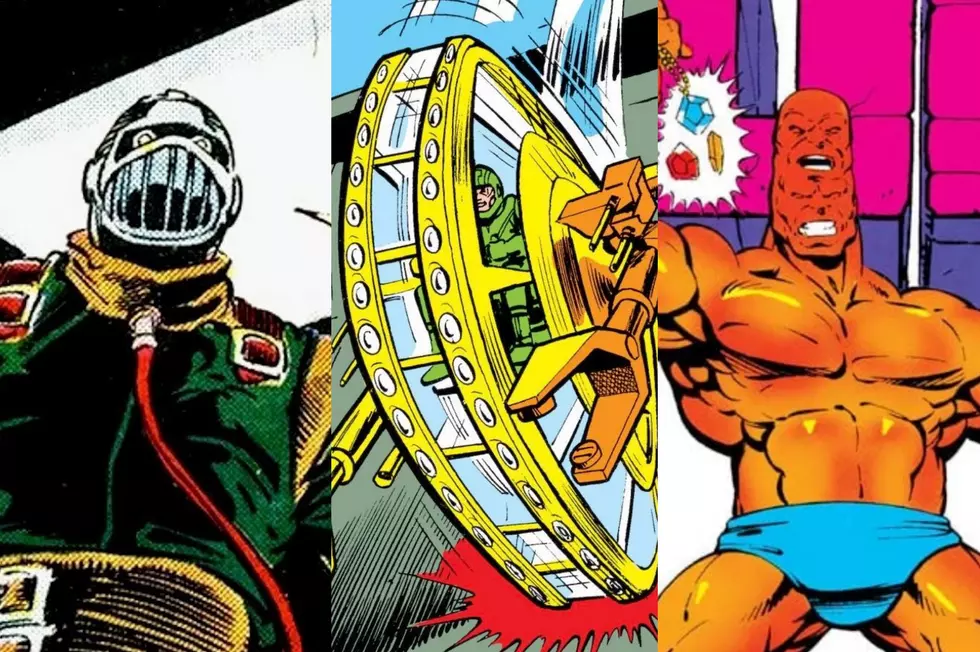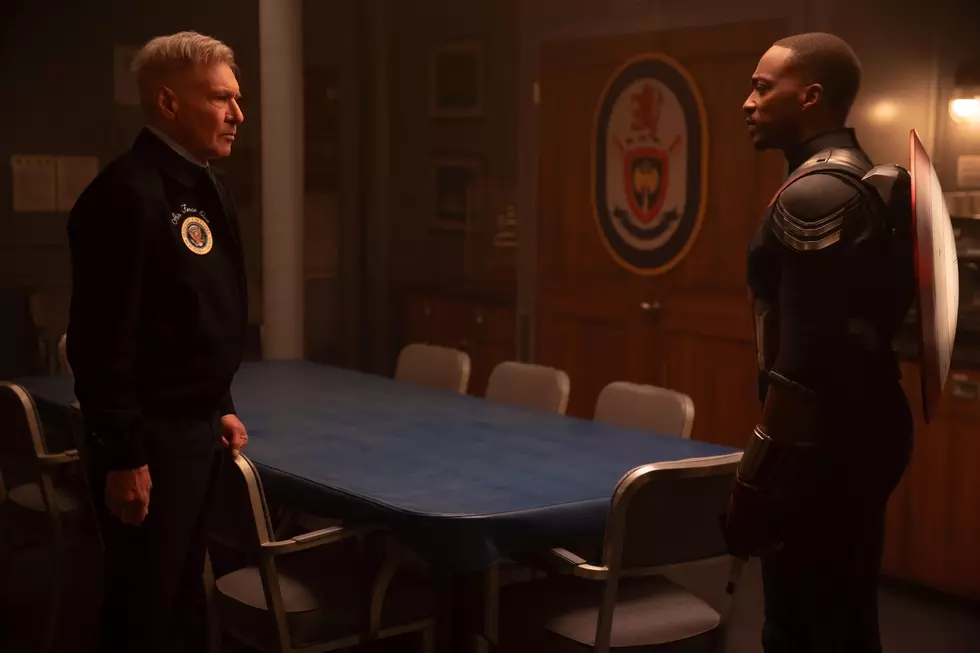
Review: Marvel’s ‘Jessica Jones’ Is Like a Superhero ‘Silence of the Lambs’
Seven episodes into Marvel’s Jessica Jones, I had a hard time putting my finger on why it wasn’t clicking as cohesively as the first five episodes of Daredevil, its Netflix predecessor. True to its title heroine, this matter needed a thorough investigation. Daredevil taught us what to expect from Marvel’s next Defender series; a tenuous, passing connection to the events of the MCU, through the lens of a more adult vantage, and with a TV-appropriate sense of budget and scale. But it took until the latter half of a second viewing of those seven episodes for my Jessica Jones epiphany.
I had it all wrong.
Like the conspiracy thriller of Captain America’s Winter Soldier, or space fantasy of Guardians of the Galaxy, Marvel succeeds with a focus on genre, not heroes. Jessica Jones isn’t a superhero series; it’s super-horror. Marvel’s first taste of true terror, flavored with a dash of noir.
Jessica Jones is a superhero Silence of the Lambs. Drop the anticipation of a familiar spectacle, and it’s goddamn extraordinary.
Marvel’s biggest revelation to date; Jessica Jones is a brilliant blend of horror-noir.
Saving spoilers for next week, Marvel’s Jessica Jones sees Krysten Ritter as a hard-drinking PI skeptical of anyone showing the slightest courtesy, and ruder still to those who tolerate her. It isn’t until an innocuous case lands on Jessica’s doorstep pointing toward past nemesis Zebediah Kilgrave (David Tennant), that enough horror creeps back to life through her booze-addled sleepwalk that things spiral out of control, dragging estranged best friend Trish (Rachael Taylor), employer Jeri Hogarth (Carrie-Anne Moss), love interest Luke Cage (Mike Colter), along with neighbors and countless innocents into her waking purple nightmare.
Seven episodes offered to critics leave all the backstory a bit vague, between Jessica’s uncanny origins, brief superhero career, as well as larger ties to the Marvel Cinematic Universe*, instead relying on a nigh-unrecognizable Krysten Ritter to breathe life into our titular heroine. Whether talking back to Jeri, flirting with Luke over drinks, or snorting derisive comebacks to no one in particular, the weariness in Ritter’s voice instantly sets apart past comedic work like ABC’s Don’t Trust The B in Apartment 23, leaving little illusions around Jessica’s devilish DGAF attitude.
She’ll take care of business while taking care of business, spent toilet paper and all, finds herself in the trash on more than one occasion, and doesn’t hesitate to polish pride in her most biting of comebacks. Jessica spends her days observing people in private moments and judging them accordingly, whether a woman who breaks from the Stairmaster for quarter-pounders, or a man with vested interest in dirty heels. Seven episodes may not span the totality of her worldview, but we at least get the sense that the purest Jessica takes pride in helping people, making a difference. A flash of purpose ripped away by tragedy, and only resurfacing in minor details like a new pane glass window to Alias investigations. A chance to feel whole again. A chance to help.
*Literary spoilers withstanding, the comic Jessica Jones maintained much closer ties with top-tier Marvel heroes, including a final battle under Kilgrave’s thrall that saw the Avengers beating her into a coma. Netflix’s version understandably omits any association with Earth’s Mightiest Heroes, though context curiously avoids referencing specific characters and events, even as the Age of Ultron should have made acknowledgements more prolific.
Naturally, where Daredevil flourished in establishing Vincent D’Onofrio’s Wilson Fisk as a Ying to Matt Murdock’s Yang, Jessica Jones too finds unrelenting excitement in fleshing out David Tennant’s Kilgrave, even amid his limited appearances in early episodes. The former Doctor Who relishes in his distinct timbre and impenetrable suave, but astonishingly crafts as much presence in person as he does out. The paranoia inherent to Jessica’s traumatized state puts Kilgrave around every corner, whether the little girl relaying a message, a cabbie ready to kidnap her, or any and every soul with a camera in her direction. Kilgrave stays with her, inside and out, and while not untouchable, Tennant’s terrifying baddie brings a twisted unpredictability to electrify every scene, gripping your heart in an even tighter vice by his true motivations for resurfacing in Jessica’s life.
A well-rounded supporting cast helps keep the central focus on Jessica’s terror afloat, even as Daredevil tended to balance its darker outings with a certain camaraderie and warmth between its leads. Rachael Taylor’s Patsy “Trish” Walker for instance brings a more traditional brand of female empowerment to Jones’ trauma-based narrative, training in Krav Maga for ultimate say over whom she allows a touch, or choosing to forgive and embrace a man who’d previously assaulted her, all the while reminding that said privilege shouldn’t guarantee an opinion in her affairs. Figurative and more literal sisterly bonds keep her and Jessica at varying temperatures through Kilgrave’s return, though their rapport quickly emerges as a central dynamic of friendship in shared trauma.
Mike Colter’s Luke Cage adds another Sweet Christmas-sized piece to the puzzle, albeit with a more mixed efficacy. On the one hand, Colter himself seems somewhat inexpressive beyond the initial confidence and presence, even as our seven central episodes put the character through every extreme imaginable. That in mind, the relationship forged between Cage and Jessica explodes onto the screen, an exuberant, effervescently sex-positive pairing enhanced by a mutual appreciation of each other’s durability; physical compatibility giving life to emotional entanglement. Granted godly strength*, the two have only to find ways to hurt one another on an emotional plane, and Jones never once pulls the punch.
*Furthering an emphasis on character psychology over combat, Jones’ and Luke Cage’s fighting styles garner far less visual flare than Daredevil. There’s a certain logic behind that, as Luke need only tap someone’s skull to send them spiraling, but Jessica Jones at least finds fruition in more caper-based action, than elaborate fight sequences.
A few other odds and ends don’t fit in quite so well (yet), as with repeat emphasis on Jeri Hogarth’s personal relationships, as well as that of Jessica’s neighbors, Eka Darville’s Malcolm included, at least until a certain point in the narrative. At the very least, a more human cast raises important questions amid a reality where a man shushes busy restaurants with a single phrase: how much of our own identities rest within our most selfish choices, and how much can we blame on others?
All that in mind, nothing pulls the spotlight from Jessica’s story. Within Jessica Jones lies a world full of suffering at every turn, broken souls longing desperately to heal. Jones breaches its most emotionally challenging in emphasis of its title hero’s victimization, and all those left traumatized by the tragic hold of unanswered violation. Excitement and a more driven story lie within Jessica’s creative wits to solving procedural cases, rather than her brute, often clumsy strength. That kind of depth might just be Marvel’s biggest revelation to date; a brilliant blend of horror-noir, and a tragic case study in empowerment.
AND ANOTHER THING …
- At last, we have confirmation that Channing Tatum exists in the Marvel Universe.
- “Self-respect. Get some.”
- There’s undoubtedly more sex at work here than we’ll ever see from anyone else under the Marvel umbrella, though not without the stock L-shaped sheets, or occasionally, jeans.
- As I said, some of the dialogue cryptically bends around speaking any actual Avengers’ names (Daredevil at least said “Captain America” aloud), though Jessica Jones might be the first TV property to display one of their costumes.
- Stranger still, while “The Incident” gets a few namedrops, no one wants to call out the evil robot who took an Eastern European country for a ride?
- It takes a New Yorker to end up bothered by certain landmark details, whether the continued presence of the MetLife building, reference to a warehouse on 14th and 8th (it’s a busy intersection), or a sequence that seemingly cuts between winter and spring in Union Square.
- Yes, you will at least see Jessica’s comic costume, albeit without the pink hair.
- “If this is a booty call, I like your chances.”
- There’s enough references and allusions to Jessica’s limited flight, that I’d presume we actually see her gain control of it at some point.
- There is at least one Daredevil crossover, though not everyone will necessarily notice at first.
Marvel’s Jessica Jones will premiere all 13 episodes on Netflix beginning Friday, November 20.
More From ScreenCrush









